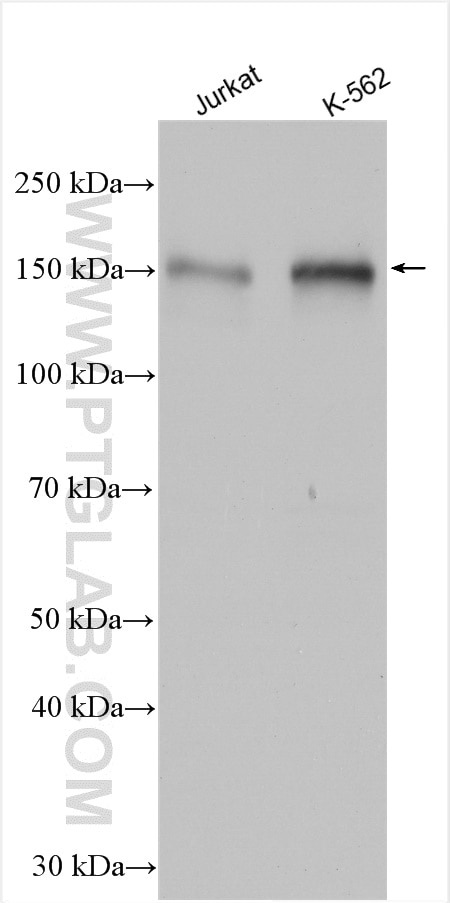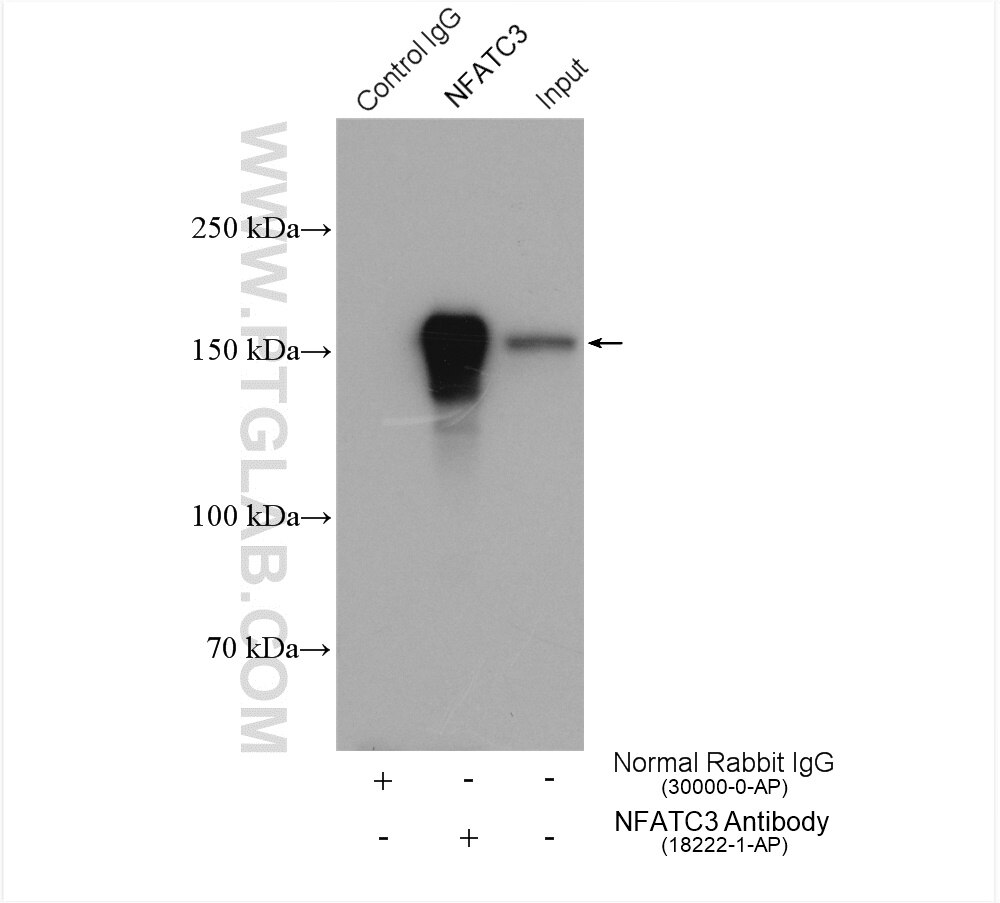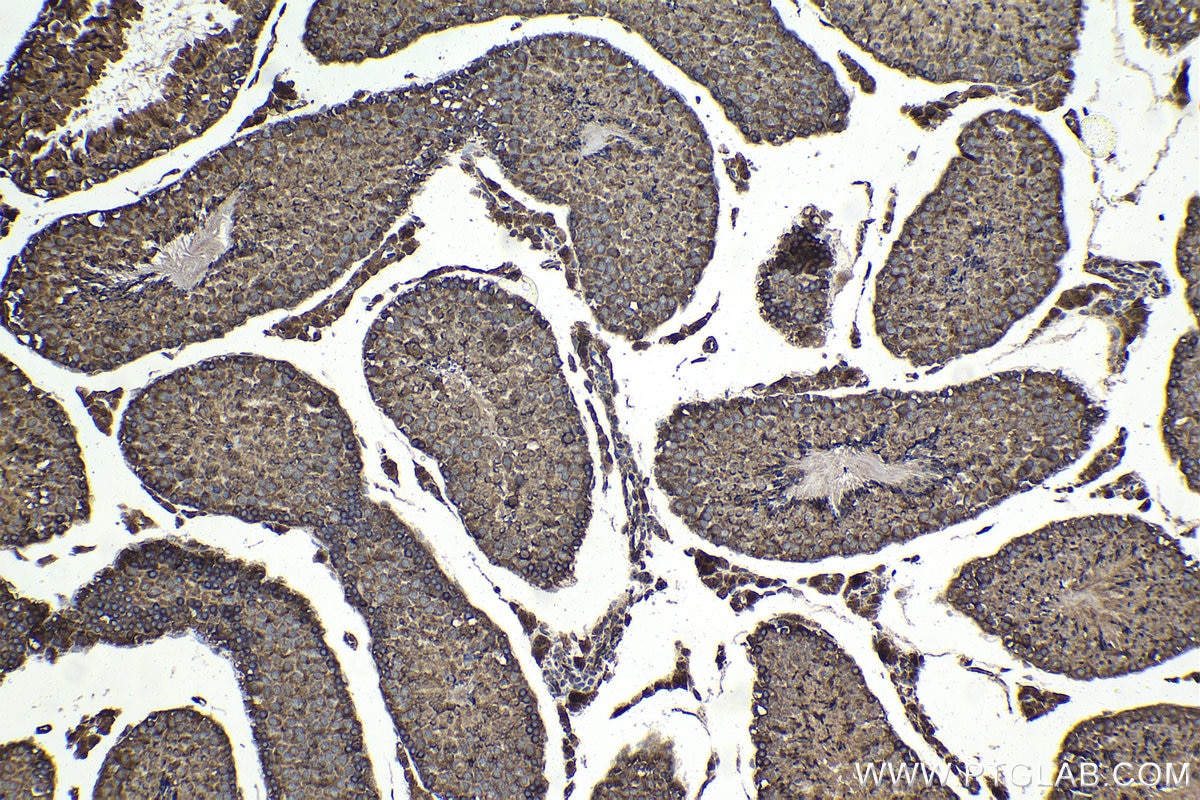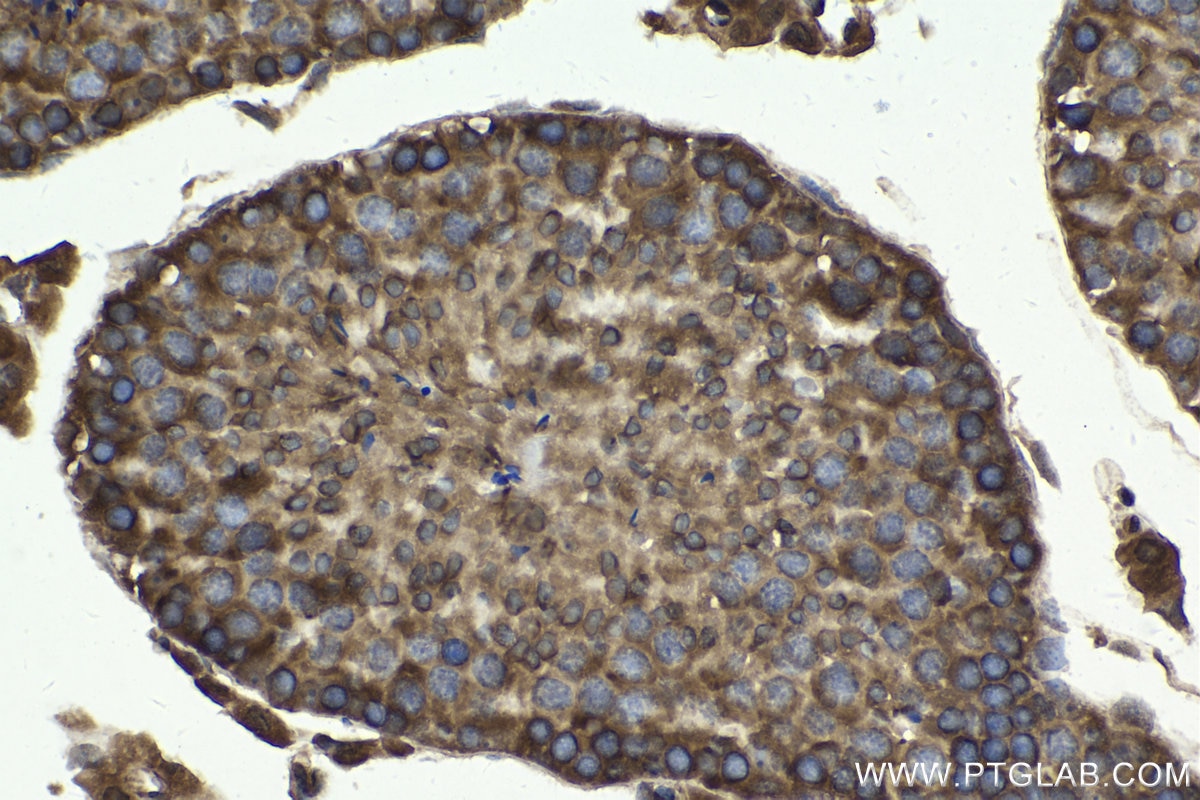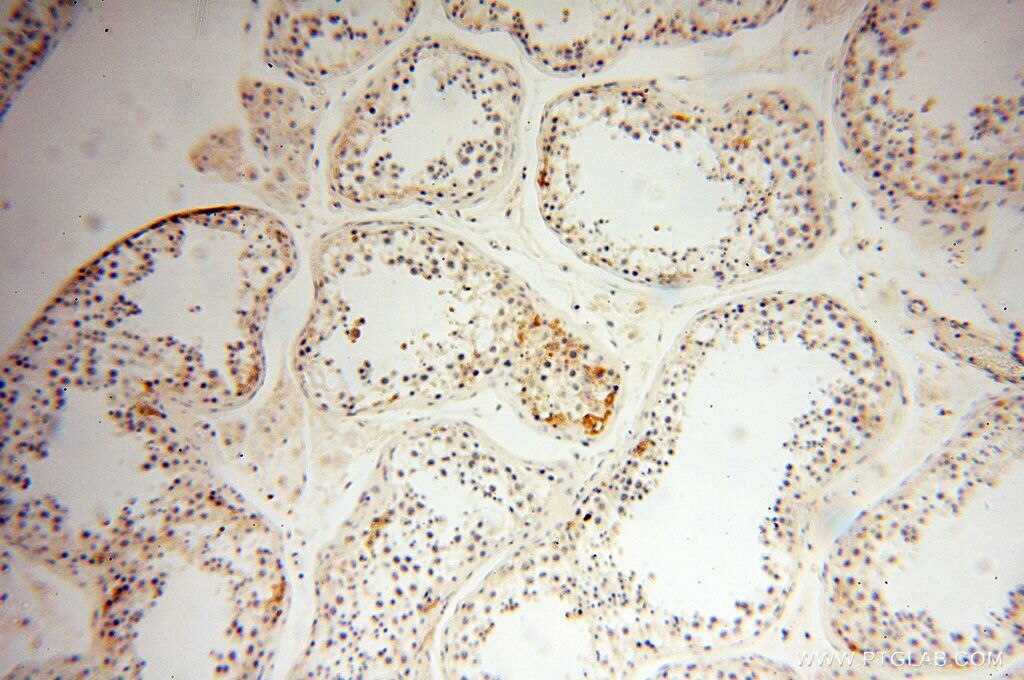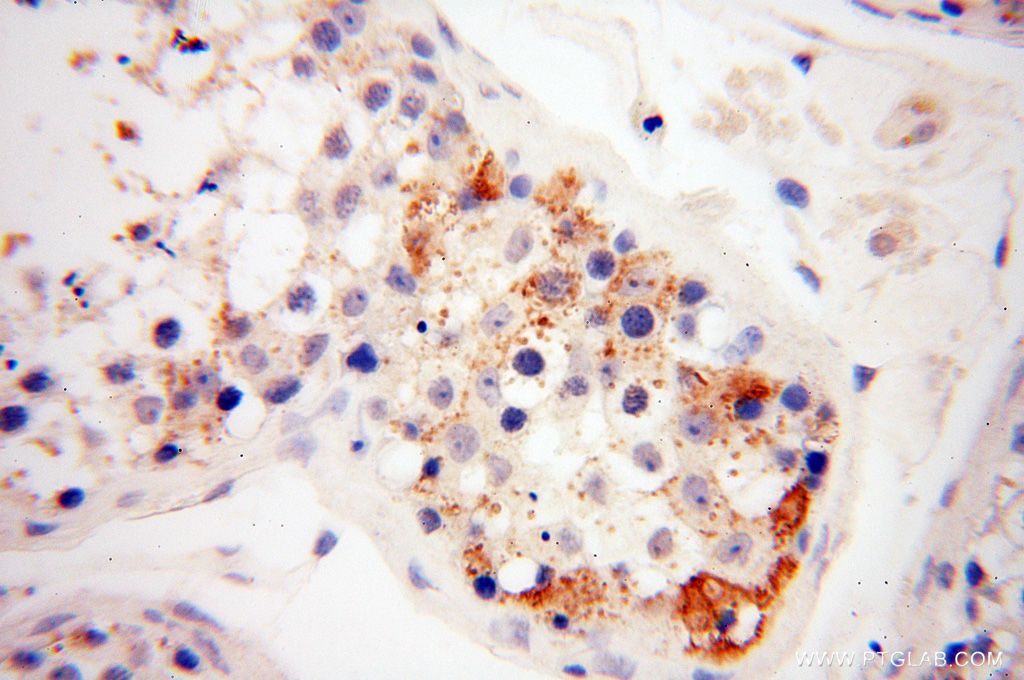- Featured Product
- KD/KO Validated
NFATC3 Polyklonaler Antikörper
NFATC3 Polyklonal Antikörper für WB, IHC, IP, ELISA
Wirt / Isotyp
Kaninchen / IgG
Getestete Reaktivität
human und mehr (2)
Anwendung
WB, IHC, IF, IP, ChIP, ELISA
Konjugation
Unkonjugiert
Kat-Nr. : 18222-1-AP
Synonyme
Geprüfte Anwendungen
| Erfolgreiche Detektion in WB | Jurkat-Zellen, K-562-Zellen |
| Erfolgreiche IP | K-562-Zellen |
| Erfolgreiche Detektion in IHC | Maushodengewebe, humanes Hodengewebe Hinweis: Antigendemaskierung mit TE-Puffer pH 9,0 empfohlen. (*) Wahlweise kann die Antigendemaskierung auch mit Citratpuffer pH 6,0 erfolgen. |
Empfohlene Verdünnung
| Anwendung | Verdünnung |
|---|---|
| Western Blot (WB) | WB : 1:2000-1:12000 |
| Immunpräzipitation (IP) | IP : 0.5-4.0 ug for 1.0-3.0 mg of total protein lysate |
| Immunhistochemie (IHC) | IHC : 1:500-1:2000 |
| It is recommended that this reagent should be titrated in each testing system to obtain optimal results. | |
| Sample-dependent, check data in validation data gallery | |
Veröffentlichte Anwendungen
| KD/KO | See 2 publications below |
| WB | See 23 publications below |
| IHC | See 2 publications below |
| IF | See 7 publications below |
| IP | See 1 publications below |
| ChIP | See 4 publications below |
Produktinformation
18222-1-AP bindet in WB, IHC, IF, IP, ChIP, ELISA NFATC3 und zeigt Reaktivität mit human
| Getestete Reaktivität | human |
| In Publikationen genannte Reaktivität | human, Maus, Ratte |
| Wirt / Isotyp | Kaninchen / IgG |
| Klonalität | Polyklonal |
| Typ | Antikörper |
| Immunogen | NFATC3 fusion protein Ag12985 |
| Vollständiger Name | nuclear factor of activated T-cells, cytoplasmic, calcineurin-dependent 3 |
| Berechnetes Molekulargewicht | 116 kDa |
| Beobachtetes Molekulargewicht | 130-170 kDa |
| GenBank-Zugangsnummer | BC001050 |
| Gene symbol | NFATC3 |
| Gene ID (NCBI) | 4775 |
| Konjugation | Unkonjugiert |
| Form | Liquid |
| Reinigungsmethode | Antigen-Affinitätsreinigung |
| Lagerungspuffer | PBS with 0.02% sodium azide and 50% glycerol |
| Lagerungsbedingungen | Bei -20°C lagern. Nach dem Versand ein Jahr lang stabil Aliquotieren ist bei -20oC Lagerung nicht notwendig. 20ul Größen enthalten 0,1% BSA. |
Hintergrundinformationen
NFAT (nuclear factors of activated T cells) proteins are a family of transcription factors originally identified as mediators of activation of cytokine genes in response to antigenic stimulation of T cells. NFAT proteins also play varied roles in cells outside of the immune system [PMID:11877454]. NFATc3 has specifically been implicated in vasculature development, regulation of smooth muscle contractile phenotype, and modulation of vascular smooth muscle contractility [PMID:11439183,17148444]. The calculated molecular weight of NFATC3 is 115 kDa, but the post-modified protein is about 130-170 kDa (PMID: 15728531, PMID: 15857835)
Protokolle
| PRODUKTSPEZIFISCHE PROTOKOLLE | |
|---|---|
| WB protocol for NFATC3 antibody 18222-1-AP | Protokoll herunterladen |
| IHC protocol for NFATC3 antibody 18222-1-AP | Protokoll herunterladenl |
| IP protocol for NFATC3 antibody 18222-1-AP | Protokoll herunterladen |
| STANDARD-PROTOKOLLE | |
|---|---|
| Klicken Sie hier, um unsere Standardprotokolle anzuzeigen |
Publikationen
| Species | Application | Title |
|---|---|---|
Immunity Metformin inhibition of mitochondrial ATP and DNA synthesis abrogates NLRP3 inflammasome activation and pulmonary inflammation. | ||
Gastroenterology Regulator of Calcineurin 1 Gene Isoform 4, Downregulated in Hepatocellular Carcinoma, Prevents Proliferation, Migration, and Invasive Activity of Cancer Cells and Growth of Orthotopic Tumors by Inhibiting Nuclear Translocation of NFAT1. | ||
Cell Death Differ Trim39 regulates neuronal apoptosis by acting as a SUMO-targeted E3 ubiquitin-ligase for the transcription factor NFATc3. | ||
Oncogene Regulator of calcineurin 1 gene isoform 4 in pancreatic ductal adenocarcinoma regulates the progression of tumor cells. | ||
Cancer Lett TRPC3 promotes tumorigenesis of gastric cancer via the CNB2/GSK3β/NFATc2 signaling pathway. | ||
Cell Biol Toxicol HNRNPA2B1 stabilizes NFATC3 levels to potentiate its combined actions with FOSL1 to mediate vasculogenic mimicry in GBM cells |
